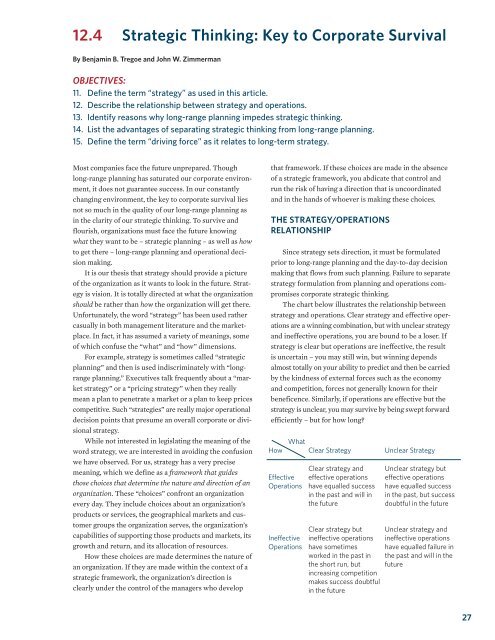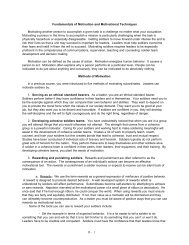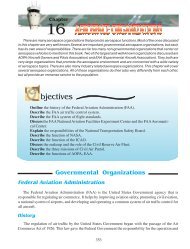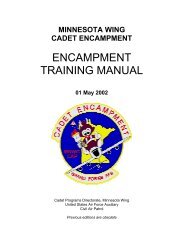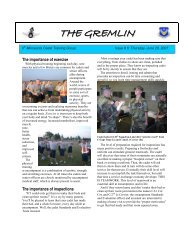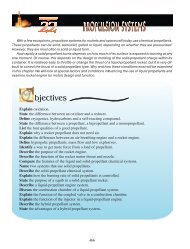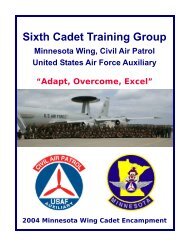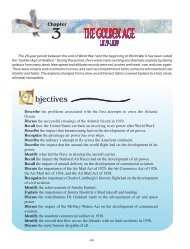LEARN TO LEAD - Civil Air Patrol
LEARN TO LEAD - Civil Air Patrol
LEARN TO LEAD - Civil Air Patrol
Create successful ePaper yourself
Turn your PDF publications into a flip-book with our unique Google optimized e-Paper software.
12.4 Strategic Thinking: Key to Corporate SurvivalBy Benjamin B. Tregoe and John W. ZimmermanOBJECTIVES:11. Define the term “strategy” as used in this article.12. Describe the relationship between strategy and operations.13. Identify reasons why long-range planning impedes strategic thinking.14. List the advantages of separating strategic thinking from long-range planning.15. Define the term “driving force” as it relates to long-term strategy.Most companies face the future unprepared. Thoughlong-range planning has saturated our corporate environment,it does not guarantee success. In our constantlychanging environment, the key to corporate survival liesnot so much in the quality of our long-range planning asin the clarity of our strategic thinking. To survive andflourish, organizations must face the future knowingwhat they want to be – strategic planning – as well as howto get there – long-range planning and operational decisionmaking.It is our thesis that strategy should provide a pictureof the organization as it wants to look in the future. Strategyis vision. It is totally directed at what the organizationshould be rather than how the organization will get there.Unfortunately, the word “strategy” has been used rathercasually in both management literature and the marketplace.In fact, it has assumed a variety of meanings, someof which confuse the “what” and “how” dimensions.For example, strategy is sometimes called “strategicplanning” and then is used indiscriminately with “longrangeplanning.” Executives talk frequently about a “marketstrategy” or a “pricing strategy” when they reallymean a plan to penetrate a market or a plan to keep pricescompetitive. Such “strategies” are really major operationaldecision points that presume an overall corporate or divisionalstrategy.While not interested in legislating the meaning of theword strategy, we are interested in avoiding the confusionwe have observed. For us, strategy has a very precisemeaning, which we define as a framework that guidesthose choices that determine the nature and direction of anorganization. These “choices” confront an organizationevery day. They include choices about an organization’sproducts or services, the geographical markets and customergroups the organization serves, the organization’scapabilities of supporting those products and markets, itsgrowth and return, and its allocation of resources.How these choices are made determines the nature ofan organization. If they are made within the context of astrategic framework, the organization’s direction isclearly under the control of the managers who developthat framework. If these choices are made in the absenceof a strategic framework, you abdicate that control andrun the risk of having a direction that is uncoordinatedand in the hands of whoever is making these choices.THE STRATEGY/OPERATIONSRELATIONSHIPSince strategy sets direction, it must be formulatedprior to long-range planning and the day-to-day decisionmaking that flows from such planning. Failure to separatestrategy formulation from planning and operations compromisescorporate strategic thinking.The chart below illustrates the relationship betweenstrategy and operations. Clear strategy and effective operationsare a winning combination, but with unclear strategyand ineffective operations, you are bound to be a loser. Ifstrategy is clear but operations are ineffective, the resultis uncertain – you may still win, but winning dependsalmost totally on your ability to predict and then be carriedby the kindness of external forces such as the economyand competition, forces not generally known for theirbeneficence. Similarly, if operations are effective but thestrategy is unclear, you may survive by being swept forwardefficiently – but for how long?WhatHow Clear Strategy Unclear StrategyEffectiveOperationsIneffectiveOperationsClear strategy andeffective operationshave equalled successin the past and will inthe futureClear strategy butineffective operationshave sometimesworked in the past inthe short run, butincreasing competitionmakes success doubtfulin the futureUnclear strategy buteffective operationshave equalled successin the past, but successdoubtful in the futureUnclear strategy andineffective operationshave equalled failure inthe past and will in thefuture27


